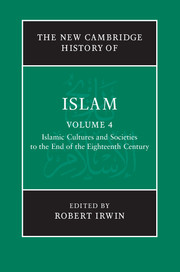Book contents
- Frontmatter
- Introduction
- PART I RELIGION AND LAW
- 1 Islam
- 2 Sufism
- 3 Varieties of Islam
- 4 Islamic law: history and transformation
- 5 Conversion and the ahl al-dhimma
- 6 Muslim societies and the natural world
- PART II SOCIETIES, POLITICS AND ECONOMICS
- PART III LITERATURE
- PART IV LEARNING, ARTS AND CULTURE
- Glossary
- Bibliography
- Index
- References
4 - Islamic law: history and transformation
from PART I - RELIGION AND LAW
Published online by Cambridge University Press: 28 March 2011
- Frontmatter
- Introduction
- PART I RELIGION AND LAW
- 1 Islam
- 2 Sufism
- 3 Varieties of Islam
- 4 Islamic law: history and transformation
- 5 Conversion and the ahl al-dhimma
- 6 Muslim societies and the natural world
- PART II SOCIETIES, POLITICS AND ECONOMICS
- PART III LITERATURE
- PART IV LEARNING, ARTS AND CULTURE
- Glossary
- Bibliography
- Index
- References
Summary
Introduction
If we must refer to the sharῑʿa as ‘Islamic law’, then we must do so with considerable caution. The latter expression bears a connotation that combines modern notions of law with a particular brand of modern politics, both of which were largely – if not entirely – absent from the original landscape of the sharῑʿa we are considering here. Throughout the last three or four centuries European modernity has produced legal systems and legal doctrines that are almost exclusively the preserve of the equally modern nation-state. Intrinsic to its behaviour, the modern state is systemically and systematically geared towards the transformation and homogenisation of both the social order and the national citizen, features that have a direct bearing on law. To accomplish these goals the state engages in systemic surveillance, discipline and punishment. Its educational and cultural institutions, among others, are designed to manufacture the citizen who is respectful of law, submissive to notions of order and discipline, industrious and economically productive. Without the law and its tools of surveillance and punishment, no state apparatus can exist. Ergo the centrality, in the definition and concept of the state, of the element of violence, and of the state’s exclusive right to threaten its use.
- Type
- Chapter
- Information
- The New Cambridge History of Islam , pp. 142 - 183Publisher: Cambridge University PressPrint publication year: 2010
References
- 1
- Cited by



